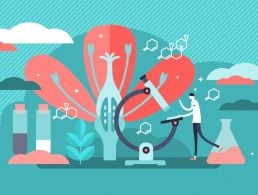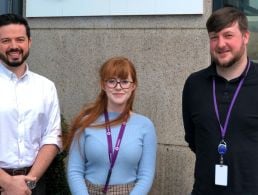Technology – like most industries – is only as good as the people who make it. If some people cannot access the workplace, everyone misses out.
This week, IrishJobs.ie and autism charity AsIAm introduced a set of guidelines for employers to make their workplaces more accommodating for autistic people. It came after a survey from the two organisations last year found that nine in 10 people believed their autism made it difficult for them to get a job.
A new Same Chance Commitment can be signed on AsIAm’s website. By signing it, employers agree to develop more inclusive recruitment processes, embed autism-friendly practices in their everyday operations, provide training for autistic people and promote autism-friendly hiring practices in Ireland.
According to Rob Enslin, the outgoing president of global customer operations at Google Cloud, employers that overlook autistic candidates for tech careers are missing out. Google Cloud runs an Autism Career Programme, which aims to support autistic people as they work in the growing cloud industry. Launching the initiative last July, Enslin said he had been working with neurodiverse people for years.
“Individuals with autism can be highly functioning and contributing professionals in any organisation,” he added. “Too often, though, the interview process can pose challenges due to unconscious bias from a hiring manager or interviewer, for example, if the candidate doesn’t look an interviewer in the eyes or asks for additional time to complete a test. This bias often unintentionally marginalises great candidates and means businesses miss out on valuable talent who can contribute and enrich the workplace.”
As part of the programme, Google Cloud was planning to work with the Stanford Neurodiversity Project, which provides consultation services to employers on opportunities for neurodiverse people in the workplace. It also aimed to train up to 500 Google Cloud managers involved in hiring processes with a view to making hiring more inclusive and effective for candidates with autism.
Orla Moran, general manager of IrishJobs.ie, and Adam Harris, CEO of AsIAm, launching the Same Chance Commitment. Image: Naoise Culhane
But it’s not just autistic people who can find it difficult to access opportunities in the workplace. The can also be challenges for people with disabilities, refugees, asylum seekers and others who face financial or sociopolitical barriers to employment.
Luckily, some Irish employers have already begun to recognise that the workplace needs more diversity. Last year, more than 40 companies including Eir, Deloitte, BT, Accenture and Aviva signed a contract pledging to commit to greater diversity and inclusion. The contract designed by Business in the Community Ireland included commitments such as disability confidence training and gender pay gap analyses.
There are also many initiatives designed for people from specific underrepresented communities. Some, like Google Cloud’s Autism Career Programme, are developed by companies while others are set up by non-profit organisations.
Irish non-profit the Open Doors Initiative brings together more than 100 members, from private companies to NGOs, to “provide opportunities to some of the marginalised members of our society” including refugees, asylum seekers and migrants, people with disabilities and disadvantaged youth, those from a Traveller background, the LGBTIQ+ community and more.
It looks to provide training, placements, apprenticeships, community supports and employment opportunities. Since its establishment in 2018, it has helped more than 16,800 people access workplace and training supports and launched projects such as Employers for Change and Towards Work.
‘Increasing employment opportunities for people with disabilities is one of the most pressing social issues facing our society’
– PADDY SMYTH
Another Irish non-profit, Rethink Ireland, created the Ability to Work Fund to support people with disabilities accessing employment. The fund was created alongside State Street and Government departments, and is providing €1.5m funding over three years to four Irish non-profits helping to develop the talents and skills of those with disabilities.
The Dublin Simon Community’s Employability Pathways programme is one of the beneficiaries of the fund, along with University College Cork’s Disability Support Service Mentoring Programme. Also receiving funding is the Not So Different Creative Hub, which promotes what neurodiverse candidates can offer employers while offering support to neurodiverse jobseekers, and WALK, which provides education, training and employment for people with disabilities.
Last September marked the Ability to Work Fund’s first year in operation. In this period, it helped 46 people with disabilities secure a work placement, while a further 117 undertook workplace training and 77 participated in an Employability Pathways programme.
Speaking at the time, Irish disability activist Paddy Smyth said that “increasing employment opportunities for people with disabilities is one of the most pressing social issues facing our society. Businesses can help address this by making a stronger effort to provide employment opportunities for people with disabilities.”
‘Bias often unintentionally marginalises great candidates and means businesses miss out on valuable talent who can contribute and enrich the workplace’
– ROB ENSLIN
Other companies are stepping up to the plate to support people who may otherwise find it very difficult to get a job.
Cork-based company Zartis runs scholarship programmes with the Code Institute to provide free tech training and mentoring to refugees and migrants. This Level Up course was launched four years ago, and earlier this year it set up a programme aimed at women in tech.
Three Irish non-profits also banded together in January to launch an online portal for migrants and refugees to access training and education programmes. The SaorEd portal is run by Doras, New Horizon and Dignity Partnership, and provides free courses in the English language, IT, healthcare and general skills in several different languages including Arabic, German and Spanish.
The IT-focused part of the portal will cover basic digital skills, intermediate IT skills and more advanced courses like web design with HTML, CSS and JavaScript.
According to John Lannon, Doras CEO, the portal was set up to be as convenient as possible for people living in direct provision centres across the country or who main not have access to training otherwise.
“Refugees and asylum seekers are among the most marginalised people in Irish society,” he added. “Education is a doorway to inclusion, connection and dignity. It opens up doorways of possibility and opportunity that are so critical for people who are often fleeing war, poverty and persecution.”
‘Refugees and asylum seekers are among the most marginalised people in Irish society… Education is a doorway to inclusion, connection and dignity’
– JOHN LANNON
The world of work has undoubtedly gone through a major shift in the past two years, with the mass adoption of remote working and learning potentially opening up new opportunities for people.
Last November, a report by Employers For Change, which is part of the Open Doors initiative, found that while remote working could remove barriers for workers with disabilities, it should not be considered a replacement for practical accommodations. This could apply to all underrepresented communities in the workplace. Out of sight should not mean out of mind.
We should all have the same opportunities in the workplace, but the idea of hiring candidates who might have different needs, abilities or backgrounds can fall far down a company’s priority list.
However, technology – like many other industries – is only as good as the people who make it. If some people cannot access the workplace, the whole world misses out.
10 things you need to know direct to your inbox every weekday. Sign up for the Daily Brief, Silicon Republic’s digest of essential sci-tech news.




